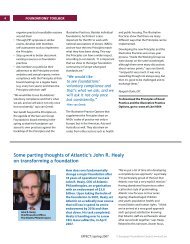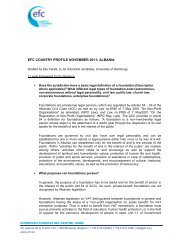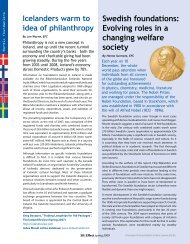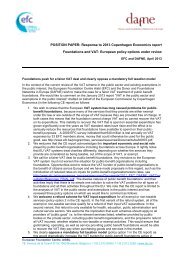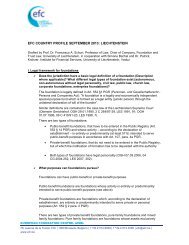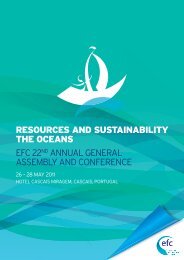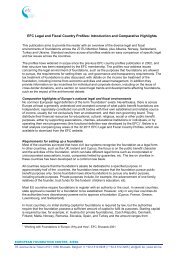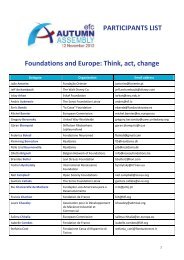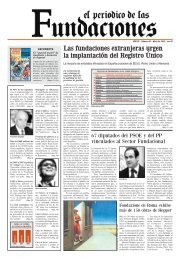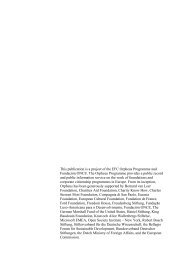European perspectives on global health: a policy glossary
European perspectives on global health: a policy glossary
European perspectives on global health: a policy glossary
You also want an ePaper? Increase the reach of your titles
YUMPU automatically turns print PDFs into web optimized ePapers that Google loves.
3. Europe must assert its role in <strong>global</strong> <strong>health</strong> governance<br />
Key actors in <strong>global</strong> <strong>health</strong><br />
Key actors in <strong>global</strong> <strong>health</strong> are those actors<br />
which either individually ( like internati<strong>on</strong>al<br />
organisati<strong>on</strong>s of influential nati<strong>on</strong>-states ) or<br />
as collective actors have an identifiable impact<br />
<strong>on</strong> <strong>global</strong> <strong>health</strong>. They must be c<strong>on</strong>sidered<br />
important partners for <str<strong>on</strong>g>European</str<strong>on</strong>g> <strong>policy</strong> makers<br />
depending <strong>on</strong> the issues involved and the<br />
interests they pursue in specific <strong>global</strong> <strong>health</strong><br />
activities.<br />
In order to locate entry points for “good” <strong>global</strong><br />
governance for <strong>health</strong>, a better understanding of the<br />
present instituti<strong>on</strong>al architecture and the c<strong>on</strong>stellati<strong>on</strong><br />
of interest and actors in <strong>global</strong> heath is necessary.<br />
While in general internati<strong>on</strong>al <strong>health</strong> circumscribes<br />
the purview of the representatives of nati<strong>on</strong>-states<br />
interacting within the defined boundaries of an<br />
internati<strong>on</strong>al organisati<strong>on</strong> such as the WHO, <strong>global</strong><br />
<strong>health</strong> is characterised by a growing and complex<br />
assemblage of actors, interacting <strong>on</strong> a wide variety of<br />
c<strong>on</strong>verging and c<strong>on</strong>flicting interests. The rapid growth<br />
of actors and activities in <strong>global</strong> <strong>health</strong> can at first<br />
glance mask the governance problems inherent in this<br />
new system. The key players are :<br />
Nati<strong>on</strong>-states play a central role in <strong>global</strong><br />
governance for <strong>health</strong>. D<strong>on</strong>or countries individually<br />
or collectively exert an important influence <strong>on</strong> <strong>global</strong><br />
<strong>health</strong> affairs. Individual countries, depending <strong>on</strong><br />
their financial and political strength, develop bilateral<br />
cooperati<strong>on</strong> projects of c<strong>on</strong>siderable importance ( e.<br />
g. US President’s Emergency Plan for AIDS Relief<br />
( PEPFAR ) in the fight against HIV / AIDS ), might<br />
influence strategies of internati<strong>on</strong>al organisati<strong>on</strong>s<br />
through c<strong>on</strong>tributi<strong>on</strong>s for specific projects or by<br />
withholding regular c<strong>on</strong>tributi<strong>on</strong>s, might take<br />
specific political positi<strong>on</strong>s in decisi<strong>on</strong> making ( e.<br />
g. in World Trade Organizati<strong>on</strong> ( WTO ) affairs ) or<br />
might collectively push for specific programmes. The<br />
power of certain d<strong>on</strong>or countries also has played an<br />
important role in creating new instituti<strong>on</strong>s outside<br />
UN Organisati<strong>on</strong>s like the Global Fund to fight AIDS,<br />
Tuberculosis and Malaria ( GFATM ). There c<strong>on</strong>tinues to<br />
be a significant power imbalance between recipient<br />
countries and d<strong>on</strong>or countries and between the North<br />
and the South.<br />
Organisati<strong>on</strong>s for cooperati<strong>on</strong> am<strong>on</strong>g<br />
industrial countries have assumed an increasingly<br />
important role for the coordinati<strong>on</strong> of interests<br />
am<strong>on</strong>g these countries and for the preparati<strong>on</strong> of<br />
initiatives. The Organisati<strong>on</strong> for Ec<strong>on</strong>omic Cooperati<strong>on</strong><br />
and Development ( OECD ) has l<strong>on</strong>g played a role in<br />
m<strong>on</strong>itoring <strong>health</strong> performance and coordinating aid<br />
efforts. Since the late 1990s, the G7 / 8 has become<br />
an important actor in <strong>global</strong> <strong>health</strong>, motivated by<br />
the growing percepti<strong>on</strong> of <strong>health</strong> as a risk to <strong>global</strong><br />
security. Health plays an increasing role in G8<br />
meetings ; the G8 were instrumental in developing<br />
the proposal for a large <strong>global</strong> <strong>health</strong> fund to fight<br />
major infectious diseases ( in particular HIV / AIDS ) and<br />
in securing and coordinating the commitment of the<br />
most powerful industrial nati<strong>on</strong>s to supporting <strong>global</strong><br />
<strong>health</strong> activities, e.g. in the c<strong>on</strong>text of supporting the<br />
achievement of the Millennium Development Goals.<br />
During recent years, organisati<strong>on</strong>s of middleincome<br />
countries ( like Brazil, India, China, South<br />
Africa ) have increasingly taken specific positi<strong>on</strong>s in<br />
internati<strong>on</strong>al politics and internati<strong>on</strong>al organisati<strong>on</strong>s.<br />
This involves to some degree taking a leading<br />
positi<strong>on</strong> in new groupings of Southern countries<br />
( like the “Group of 20 or 21” in WTO negotiati<strong>on</strong>s ;<br />
“Friends of Development” in World Intellectual<br />
Property Organizati<strong>on</strong> ( WIPO ) ). With respect to <strong>global</strong><br />
<strong>health</strong> governance ( GHG ), they play a growing role,<br />
above all in the fields of expanding the opti<strong>on</strong>s for<br />
the development of local pharmaceutical R&D and<br />
improving access to medicines in developing countries.<br />
Regi<strong>on</strong>al organisati<strong>on</strong>s such as the <str<strong>on</strong>g>European</str<strong>on</strong>g><br />
Uni<strong>on</strong>, Associati<strong>on</strong> of East-Asian Nati<strong>on</strong>s ( ASEAN )<br />
and the Organizati<strong>on</strong> of American States ( OAS ) have<br />
significantly strengthened their <strong>health</strong> portfolio and<br />
<strong>on</strong> the other end of the spectrum municipal actors<br />
are engaging in worldwide cooperati<strong>on</strong> to address<br />
local problems. The Regi<strong>on</strong>al Offices of the WHO<br />
aim to promote comm<strong>on</strong> public <strong>health</strong> strategies<br />
within six regi<strong>on</strong>s. The <str<strong>on</strong>g>European</str<strong>on</strong>g> Uni<strong>on</strong> as a<br />
regi<strong>on</strong>al organisati<strong>on</strong> c<strong>on</strong>stitutes a special case as<br />
it coordinates activities of its Member States and<br />
( basically through the EU Commissi<strong>on</strong> ) develops<br />
its own politics in <strong>global</strong> affairs. Due to a lack of a<br />
comm<strong>on</strong> strategy in many fields of <strong>global</strong> <strong>health</strong>, and<br />
a c<strong>on</strong>flict with its Member States as to independent<br />
acti<strong>on</strong> of the Commissi<strong>on</strong> in <strong>global</strong> <strong>health</strong> matters, the<br />
Global Health Policy Glossary<br />
37



